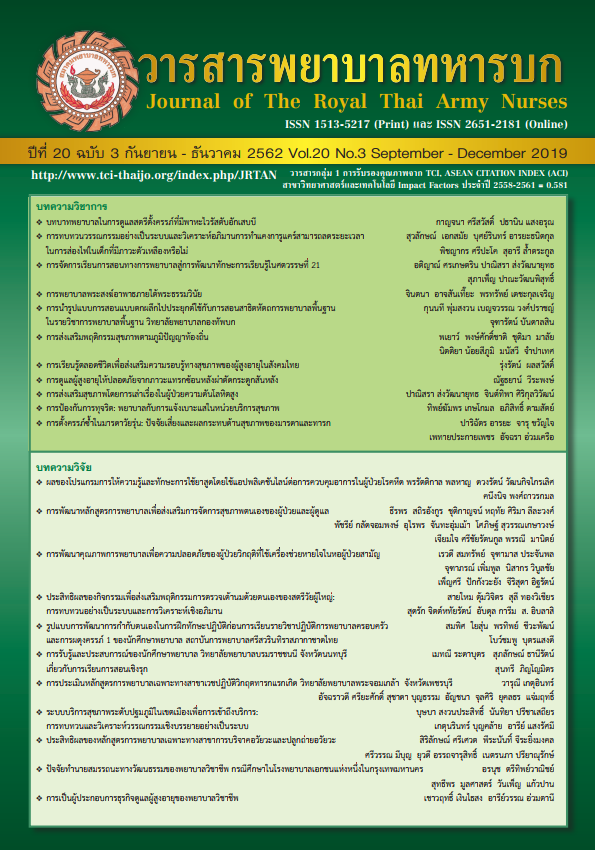Development of the Care Plan for Caregivers of Communities Dwelling Older Adult Stroke Survivors
Keywords:
development, care plan, caregivers, older adult stroke survivors, communitiesAbstract
This research and development design study aims to 1) describe the older adult stroke survivors 2) develop the care plan for caregivers. Phase 1: The descriptive design was adopted to explore needs and health care problems of nine older adult stroke survivors in Mae Kao Tom sub-district, Chiangrai, Thailand during November 2017. Phase 2: The care plan was developed based on the Joanna Briggs Institute Model of Evidence-based Healthcare. Eight systematic reviews, two meta-analyses and two guidelines published in Thai and English during 2008-2016 were derived from electronic resources. Then, the care plan with standard procedures was validated and critiqued, while all instruments for a pilot study were measured for validity and reliability. Next, the pilot study to test the feasibility of the care plan was established among six trained volunteers and four family members at Mae Kao Tom community in Chiangrai, Thailand, from December 2017 to February 2018. After an evaluation, the care plan and instruments were improved. Findings: Older adult stroke survivors need effective care plan and caregivers with knowledge and skills. The care plan contains the activities promote activities daily living and the implementation for continued treatment and rehabilitation. Additionally, the care plan includes standard procedures, the algorithm of the care plan and the standard procedures’ tests to measure caregiver competency.
Downloads
References
2. Mauk KL, Hanson P, Han D. Management of common illnesses, disease, and health candidates. In Mauk K, editor. Gerontological nursing competencies for care 3rd. Massachusetts: Jones & Bartlett Leaning; 2014. p.270-374.
3. Van Cannon L, Upadhyana RC. Cognitive and neurologic function. In Meiner SE, editor. Gerontologic nursing 5th ed. Missouri: Elsevier; 2015. p.561-605.
4. National health security office. Guideline of Long Term Care for the dependent elderly in communities. 2016
5. Burt J, Roland M, Paddison C, Reevers D, Campbell J, Abel G, et al. Prevalence and benefits of care plans and care planning for people with long-term conditions in England. J Health Serv Res Policy. 2012 Jan: 17(1) : 64-71. doi:10.1258/jhsrp.2011.010172
6. Wimolphan P, Pidchalard K, Panya P. Jitaueangkul P. Health conditions and needs of care in the development communities-dwelling elderly in Thailand. Mae Fah Luang University, Thailand. 2018. (In Thai).
7. Khongboon P. Elderly disability in Thailand; recommendations for long term care policies in the coming eras [dissertation]. Bangkok: Chulalongkorn University; 2515.
8. Cook LK, Dover C, Dickson M, Colton DL. From care plan to concept map: a paradigm shift. Teaching and Learning in Nursing. 2016 Jan;30(26): 88-92. doi: 10.1016/j.teln.2011.11.005
9. Department of Medical Services. Annual report 2017. Ministry of Health Science, Thailand. 2017. (In Thai).
10. Ventegodt, S, Merrick, J., & Andersen, NJ. Quality of Life Theory I. The IQOL Theory: An Integrative Theory of the Global Quality of life Concept. The Scientific World Journal. 2003 Oct; 3: 1030-1040. doi: 10.1100/tsw.2003.82
11. Godfrey CM, Harrison MB. Systematic review resource package: the Joanna Briggs Institute method for systematic review research quick reference guide. Kingston: Queen’s university;2015.
12. Elo, S, & Kyngas, H. The qualitative content analysis process. JAN research methodology. 2007 Nov; 62(1): 107-115. doi: 10.1111/j.1365-2648.2007.04569.x
13. Nilnate, N. Risk Factors and Prevention of Stroke in Hypertensive Patients. Journal of The Royal Thai Army Nurses. 2019;20(2):51-57. (in Thai)
Downloads
Published
How to Cite
Issue
Section
License
บทความหรือข้อคิดเห็นใดใดที่ปรากฏในวารสารพยาบาลทหารบกเป็นวรรณกรรมของผู้เขียน ซึ่งบรรณาธิการหรือสมาคมพยาบาลทหารบก ไม่จำเป็นต้องเห็นด้วย
บทความที่ได้รับการตีพิมพ์เป็นลิขสิทธิ์ของวารสารพยาบาลทหารบก
The ideas and opinions expressed in the Journal of The Royal Thai Army Nurses are those of the authors and not necessarily those
of the editor or Royal Thai Army Nurses Association.






